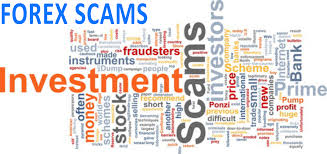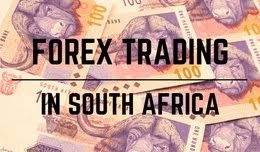You can be assured that organized crime is a global business, and, as such, it, too, must conduct annual planning exercises, utilizing technology and innovation to enhance its product line to the fullest, allocating resources to areas where it can get the biggest bang for the buck, and searching for new growth opportunities to ensure a viable future. The takeaway is that the criminal element of our society is not sitting on its hands. It will always be planning an ever-expanding attack on the vulnerable, using every trick in its bag. To protect yourself, you, too, must be planning in a way for whatever trick might be used to separate you from your hard-earned cash. Awareness is key to prevention!

During this year alone, we have witnessed crypto-currencies and related ICOs grab the fraud headlines, but not far behind were the tried-and-true criminal fare of binary options, CFDs, Ponzi schemes, clone websites, ransomware and their malware cousins, and cross-border solicitations by non-licensed entities. Regulators across the globe have been active on each of these crime fronts. This all-out regulatory pressure has forced many crooks to relocate to more friendly unregulated climes, disguise their whereabouts with elaborate registration ruses, and prey in an accelerated fashion on unsuspecting victims in developing markets, like Asia and South Africa for example.
What are a few recent examples of the familiar tools of the forex fraud trade?
A quick review of industry rags indicates that it is pretty much “business as usual”. There are a few standout stories that suggest that Ponzi schemes are still alive and well; clone websites continue to gain momentum; and fining perpetrators can also produce favorable mention in the press. Here is a brief rundown of the interesting ones:
U.S. and the SEC: We hope you were not enticed to do your forex day trading with a firm called Nonko Trading. These crooks “deliberately targeted those that were inexperienced or had a history of trading losses and lured them by promising generous leverage, low trading commissions, and low minimum deposit requirements.” The host of co-conspirators included Jeffrey Goldman, Christopher Eikenberry, Naris
Chamroonrat, Adam Plumer, Yaniv Avnon, and Ran Armon, all operating out of Michigan. The scheme defrauded 260 investors out of $1.4 million before it was detected. Nonko sold a “demo” system, as if it were real, while pocketing the funds in the background and making a few Ponzi-style refunds to appear legitimate.
U.K and the FCA: In the first week of September, the FCA has already issued press releases alerting consumers of three clone websites: Tickeo, Benford Heritage Credit Union Limited, and Tullett Prebon. No other regulator seems to be as able in ferreting out these types of bad guys, although the act of cloning has been mushrooming in all jurisdictions. In our previous article, we noted how this new Identity Theft ruse, referred to as “Whaling”, works: “Whaling scam emails are “designed to masquerade as a critical business email, sent from a legitimate business authority.” The links connect with clone websites that convince the target to verify current login credentials or provide private personal information. Looks can be deceiving.”
EU, ESMA, and CySEC: The European continent has had one month to react to new ESMA regulations that ban binary options in the EU and place heavily restrictive limits on CFD products. The jury is still out on CySEC officials, who have been under the ESMA gun to clean up compliance issues with their licensees. The Cyprus regulator has issued a plethora of new rules and regulations over the past year, but has yet to suspend any licenses. It prefers to follow the fining route, which many doubt will solve any of the problems at hand. This week, CySEC announced that it has fined LQD Markets €50,000, “an administrative fine for non-compliance in relations to the maintenance of its records.”
New Zealand and the FMA: Ponzi schemes are apparently alive and well in the “Land of the Long White Cloud”. According to court reports, “Lance Jack Ryan, aka Lance Jared Thompson, and his “patsy and dupe” Jimmie Kevin McNicholl sucked in 900 investors, which paid for their jet-set lifestyles, million-dollar homes and flash cars.” Both men have been prosecuted and jailed for deceiving investors out of $8.3 million. In true Ponzi fashion, these crooked money managers were guilty of “false accounting, forgery, altering documents, and theft.” Their firm, BlackfortFX, never invested in a legitimate forex trading platform. These “novice” fraudsters, however, had no exit strategy. As a result of their lavish domestic spending, officials were able to recover a substantial amount of investor funds, such that the liquidator has announced a 34 cents on the dollar recovery payment, a rarity in this type of crime.
What can be learned from recent attacks on consumers in South Africa?
Fraudsters are always on the lookout for greener pastures where they might ply their trade on an unsuspecting population of consumers, especially where economic conditions have created a new wealthy class in a developing country. Asia has been particularly hard hit in the past year, both in India and Malaysia. Headline stores have emanated from both countries, as well as from others, but the African continent had been generally unaffected by these assaults.
This statement is no longer true, judging by the press reports from the Republic of South Africa, which gained its independence from British rule in 1910 and finally abolished apartheid in April of 1994. South Africa is the largest country in Southern Africa, with a population of 56 million and a thriving economy that is a leader amongst all African nations. The ZAR, or from the Dutch Zuid-Afrikaanse Rand, is the national currency, and, like other emerging market currencies, it has weakened during 2018, down some 15% in value versus the USD. The Rand does float in the foreign exchange market, and capital flight is always an issue for government officials.

Forex trading, however, has, to the consternation of many, gained immediate popularity amongst the masses, establishing a foothold that is largely unregulated. Training classes charge upwards of $1,500 and multiples higher for a two-day seminar that barely scratches the surface in providing the necessary essentials for successful trading. As a result, the casualty rates are estimated to be as high as 95%. Yes, there are some success stories, if you believe the tales on social media, but reporters have interviewed many such traders and found that most have lost as much as they have gained.
Why the sudden allure? As in other locales, greed and the desire to get rich quick are the driving forces behind the surge in activity. Day training seminars proliferate the landscape, and, as you might expect from prior experiences in other countries, scam artists lurk at every turn in the value chain. Per one local broker: “Fake trainers, fake brokers, fake traders or trading companies; all they care about is getting their hands on people’s money. Next thing, their offices are closed and they can’t be reached on the phone or traced on social media. Scammers prey on people’s desperation.”
Legitimate non-banking forex brokers must obtain a license by registering with the Financial Services Board (FSB), which attempts to protect consumers from fraud in the non-banking financial services sector. As in other markets, alerting local citizens is never enough, especially if fraud is pervasive throughout the local industry. Claiming that transgressors will be fined and imprisoned is not enough. Actual prosecutions and clean-up actions are necessary from law enforcement authorities, or the present “Wild West” atmosphere will persist.
The lack of standards in the training arena is also problematic. Many instructors play into the greed and get-rich-quick notion by asking such leading questions as:
- “Who wants to make serious money in this room?”
- “What are you financially sick and tired of?”
- “Are you tired of getting paid only 12 times in 365 days?”
- “Do you want to be your own boss?”
- “Do you want to earn in a month what you earn in an entire year?”
Reporters in the local press are beginning to expose the con games that have been flourishing of late. Victims have typically been those consumers that are misinformed, desperate, and gullible to believing any rags-to-riches story portrayed on social media, complete with extravagant lifestyles achieved by traders in their twenties in a short period of time. These reporters also echo the same good advice that we have repeated over and over again, such as the following seven considerations from one account:
- Forex trading is very high risk;
- It’s an emotional rollercoaster;
- You might never become a millionaire;
- There are no guarantees;
- There are lots of scammers out there;
- There are some regulatory issues to consider; and
- Start with a demo account, preferably.
South Africa has also not been immune to the growing controversies surrounding crypto-currencies and their brethren, Initial Coin Offerings (ICOs). Remarkably enough, the first crypto-coin fraud to hit Africa occurred in 2016. At that time, a fellow by the name of Ref Wayne was “touting Pipcoin as Africa’s first crypto-currency, selling units at R100, and promising monthly returns of 35%, while he was pocketing the money in the background.” Only a very small percentage of investors ever received their coins, which were eventually renamed SAcoin, worth perhaps only a few cents in today’s trading market. Ref Wayne recently popped up again on Twitter, but he disappeared when challenged online about his Pipcoin failure.
Was that the end of crypto-currency fraud in South Africa? Unfortunately, it was not. Headlines back in May of this year screamed, “$50-million crypto-currency scam cripples South African investors.” The firm this time was known as BTC Global, run by a supposed “master trader” by the name of Steve Twain. He may not even exist, as many now believe. The Serious Commercial Crimes Unit has already received 27,500 complaints from investors that were conned into transferring Bitcoins, some $1,800 on average, into an online wallet account, never to be seen or heard of again. Investors had been promised a 14% weekly return on every $1,000 invested. If it sounds to good to be true, then…
Concluding Remarks
Make no mistake about it – Fraud is a business, just like any other legitimate one. They, too, have a strategic plan, which involves how they plan to penetrate in every market on this Earth, whether by technology and product innovations or by old tried-and-true schemes that always seem to work their magic on an unsuspecting public.
Did these stories raise your awareness level? Stay vigilant, and don’t become a victim!
Related Articles
- Forex vs Crypto: What’s Better For Beginner Traders?
- Three Great Technical Analysis Tools for Forex Trading
- What Does Binance Being Kicked Out of Belgium Mean for Crypto Prices?
- Crypto Traders and Coin Prices Face New Challenge as Binance Gives up its FCA Licence
- Interpol Declares Investment Scams “Serious and Imminent Threat”
- Annual UK Fraud Audit Reveals Scam Hot-Spots
Forex vs Crypto: What’s Better For Beginner Traders?
Three Great Technical Analysis Tools for Forex Trading
Safest Forex Brokers 2025
| Broker | Info | Best In | Customer Satisfaction Score | ||
|---|---|---|---|---|---|
| #1 |
|
Global Forex Broker |

BEST SPREADS
Visit broker
|
||
| #2 |
|
Globally regulated broker |

BEST CUSTOMER SUPPORT
Visit broker
|
||
| #3 |
|
Global CFD Provider |

Best Trading App
Visit broker
|
||
| #4 |
|
Global Forex Broker |

Low minimum deposit
Visit broker
|
||
| #5 |
|
Global Forex Broker |

Low minimum deposit
Visit broker
|
||
| #6 |
|
CFD and Cryptocurrency Broker |

CFD and Cryptocurrency
Visit broker
|
||
|
|
|||||
Forex Fraud Certified Brokers
Stay up to date with the latest Forex scam alerts
Sign up to receive our up-to-date broker reviews, new fraud warnings and special offers direct to your inbox


